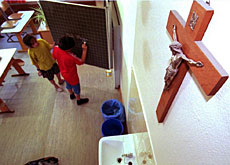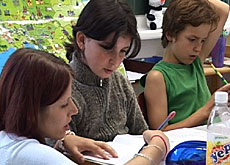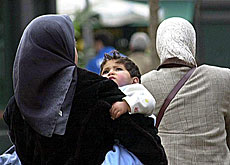Schools seek to broaden religious education

What is Christmas? Ramadan? Yom Kippur? More and more Swiss schools are trying to answer these questions through non-confessional religious teaching.
Canton Obwalden is a case in point. In 2005 it introduced “Religion and Ethics” into its school curriculum, to be taught not by religious instructors but by regular teachers.
The federal constitution guarantees freedom of religion and conscience, and no one can be forced to attend lessons on religion.
But the country’s federal system does not allow a general framework to be imposed, because every canton – and there are 26 of them – has its own rules.
“Where religious orientation and teaching are concerned, Switzerland is a patchwork,” comments Ralph Kunz, professor of Practical Theology at Zurich University.
In eastern Switzerland, the cantons have always cooperated with the country’s official churches – Catholic and Reformed – making their facilities available or integrating religious instruction into the school timetable.
But in the west, a French type of secularism prevails, and the separation between Church and State (and consequently School) is more clearly defined.
A changing world
The institution of the priest or pastor coming into school for an hour a week is a legacy of a time when almost all Swiss pupils belonged to one of the country’s two main churches. Now things are changing owing to the secularisation of society and immigration.
To combat ignorance and prejudice and encourage mutual understanding, more and more cantons are introducing obligatory religious education into their school curricula. These lessons are obligatory because the purpose is no longer to teach one church’s doctrine, but to convey knowledge about different religions.
In Protestant canton Bern, the principle of teaching religious studies to all pupils was adopted ten years ago. Now traditionally Catholic areas of central Switzerland are developing similar programmes for primary schools.
Obwalden introduced its Religion and Ethics programme this year.
“The fact that the lessons are obligatory presupposes a neutral attitude on the part of the teacher,” comments Kunz. “This is not only true of religion. It also applies to politics; in school, it is not legitimate to promote party political positions.”
Whose job?
Given that the most recent census data shows a steady decline in religious affiliation among the Swiss, the authorities’ efforts to teach religious studies may seem surprising.
“In fact”, explains Ralph Kunz, the idea that someone should teach religion – whether the Church or the State – is broadly accepted.
“Sociological research shows that 80 per cent of Swiss think it important that religion be taught, even though they may not be personally active in a faith community or may have abandoned the church completely.”
This sentiment was underestimated by the cantonal government of Zurich, which decided to cut its financial support for religious instruction in schools. It was not long before a people’s initiative was under way to reverse this decision.
Although most people seem to acknowledge that religious knowledge is a cultural asset which should be transmitted to future generations, there is as yet no real consensus on who should take on this role in schools.
Different interests
For Kunz, it is important to realise that the debate is motivated by different interests. “As citizens, we want to preserve a values-based society, enrich culture, promote tolerance. As believers, our interest is in faith; we want our children to experience a relationship with God.”
The danger with generalised religious education is that it empties religion of this faith dimension.
But on the positive side, it does involve minorities, who are often too few in number or lack the financial resources to organise confessional courses, as well as children from families not professing any religion.
“My hope is that the trend towards non-confessional religious education will engender in our children respect for others, and the joy of discovering that human religious faith has many forms of expression,” concludes Kunz.
swissinfo, Doris Lucini
Over the past 20 years, the proportion of people belonging to one of the two official Swiss churches (Catholic and Reformed) has declined from 92 to 77%.
2000 census figures: Roman Catholics 41.8%, Protestants 35.3%, Muslims 4.3%, no religious affiliation 11.1%.
Between 1970 and 2000, the number of people with no religious affiliation increased tenfold.
Between 1990 and 2000, the number of Muslims and Orthodox believers almost doubled.
The steady secularisation of society and the religious diversification caused by immigration have led to renewed debate on the place of religion in schools.
The teaching of religious knowledge, seen as a cultural asset, is increasingly being entrusted to state schools, where it is taught on a neutral basis and is obligatory for all pupils.
But in some cantons this task is still left to the local churches and attendance is optional.

In compliance with the JTI standards
More: SWI swissinfo.ch certified by the Journalism Trust Initiative


You can find an overview of ongoing debates with our journalists here. Please join us!
If you want to start a conversation about a topic raised in this article or want to report factual errors, email us at english@swissinfo.ch.